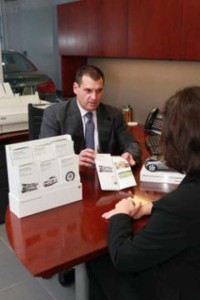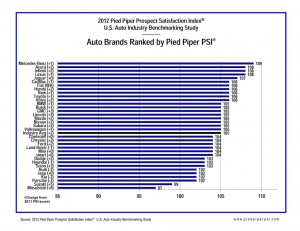Mercedes-Benz dealers are most likely to deliver customers the sort of shopping experience they want – and then close the deal, according to a new study.
Asian luxury dealers were close behind, along with Jaguar and Cadillac, according to the latest Pied Piper Prospect Satisfaction Index which uses so-called “mystery shoppers” to measure the way potential car buyers are treated.
The study looks at 60 different sales activities, from the simple act of greeting a customer when they walk into the showroom to providing a test drive. Surprisingly, salespeople proved reluctant to take one of the most important steps of all, actually asking a prospect if they’re ready to close the deal.
“The world has changed dramatically with the advent of the Internet,” said Pied Piper research chief Fran O’Hagan. Twenty years ago, the dealer was the gatekeeper, controlling every aspect of the car buying process. Today, however, “A customer can go to the showroom knowing as much as you want. So, the role of the salesperson has changed.”
And so has the balance of power. The best dealerships recognize and adapt to this shift, he explained, noting that the pace of change is so rapid – and the best brands have adapted so quickly – that a company that scored third in the Pied Piper study in 2008 would rank near the bottom in 2012 with the same score.
Mercedes dealers, on average, have done the best job recognizing the transformation on the retail side of the business. That was one of the key goals of Ernst Lieb, the CEO Of the German maker’s U.S. sales subsidiary who left the company last year. The challenge will now be for his successor to maintain that momentum.
Mercedes scored a record 109 on the Pied Piper chart but Acura, Infiniti and Lexus all came in a close second, at 108, underscoring the overall improvement on the retail side of the automotive business. Jaguar came in at 107 and Cadillac scored 106.
Luxury brands, in general, topped the charts — no surprise, according to O’Hagan, when salespeople might earn 10 times more for each sale than with a mainstream brand. But a number of less flashy marques, ranging from Fiat to Honda, were close behind.
And there were several high-line brands that lagged well behind the leaders, including Audi and Porsche, the latter landing third from the bottom in the new study.
Significantly, the Pied Piper survey does not focus on quality, where Porsche recently surged to the top, ranking second in last month’s J.D. Power Initial Quality Survey.
Quality is clearly critical to keeping customers loyal, noted O’Hagan. But if a potential buyers doesn’t like the way they’re treated during the sales process they’re likely never to buy a brand in the first place.
What does it take to be successful? “You can boil it down to a single word: ‘helpful,’” suggested O’Hagan. “Salespeople have learned to be more helpful.”
Among other effective steps taken at the best showrooms:
- Salespeople work to build rapport with potential buyers as quickly as possible;
- They focus on the issues that matter most to the customer;
- They sell the dealership as much as the vehicle;
- And they ultimately ask for the sale. Typically, a salesperson needs to ask seven times before closing a deal.
The best manufacturers, meanwhile, encourage all their dealers to adopt the common practices that work best, creating a uniform sales process coast-to-coast.
The Pied Piper study was based on reports filed by 4,419 anonymous mystery shoppers between June 2011 and June 2012.


